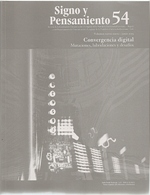Resumo
Reseña del libro: Lévy, P. (2007). Cibercultura. La cultura de la sociedad digital. [Informe al Consejo de Europa]. Prólogo: Manuel Medina. Barcelona: Rubí; México: Anthropos, Universidad Autónoma Metropolitana. ISBN: 978-84-7658-808-6.
Pierre Lévy, historiador, filósofo y sociólogo tunecino, miembro de la Academia de Ciencias de Canadá y director de la Cátedra de Investigación en Inteligencia Colectiva en la Universidad de Ottawa, es mundialmente reconocido como “filósofo del ciberespacio”, pionero en el estudio y aportes sobre el desarrollo y las implicaciones de la inteligencia colectiva en la sociedad a través de un medio como Internet. Es reconocido, además, como uno de los más grandes estudiosos de la cultura virtual en el mundo. Autor, entre otras, de obras como: La machine univers (1987), La ideografía dinámica (1991), Las tecnologías de la inteligencia (1994), ¿Qué es lo virtual? (1995), Cibercultura (1997) y Ciberdemocracia (2004). El texto de Cibercultura corresponde a un informe presentado en 1997 ante el Consejo de Europa sobre las implicaciones culturales de las tecnologías digitales de comunicación e información. Aunque algunas técnicas y dispositivos hayan quedado rezagadas al cabo de diez años, sin embargo, sus planteamientos de este “proyecto fundamentalmente humanista” (p. 174) siguen teniendo validez para la cultura contemporánea conectada con la Internet.
Esta revista científica se encuentra registrada bajo la licencia Creative Commons Reconocimiento 4.0 Internacional. Por lo tanto, esta obra se puede reproducir, distribuir y comunicar públicamente en formato digital, siempre que se reconozca el nombre de los autores y a la Pontificia Universidad Javeriana. Se permite citar, adaptar, transformar, autoarchivar, republicar y crear a partir del material, para cualquier finalidad (incluso comercial), siempre que se reconozca adecuadamente la autoría, se proporcione un enlace a la obra original y se indique si se han realizado cambios. La Pontificia Universidad Javeriana no retiene los derechos sobre las obras publicadas y los contenidos son responsabilidad exclusiva de los autores, quienes conservan sus derechos morales, intelectuales, de privacidad y publicidad.
El aval sobre la intervención de la obra (revisión, corrección de estilo, traducción, diagramación) y su posterior divulgación se otorga mediante una licencia de uso y no a través de una cesión de derechos, lo que representa que la revista y la Pontificia Universidad Javeriana se eximen de cualquier responsabilidad que se pueda derivar de una mala práctica ética por parte de los autores. En consecuencia de la protección brindada por la licencia de uso, la revista no se encuentra en la obligación de publicar retractaciones o modificar la información ya publicada, a no ser que la errata surja del proceso de gestión editorial. La publicación de contenidos en esta revista no representa regalías para los contribuyentes.


